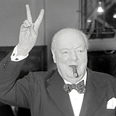
Winston Churchill
צילום: אי פי איי
Netanyahu is no Churchill
Op-ed: Prime Minister Netanyahu has been talking like Churchill but behaving like Chamberlain
Leadership is a trait. Some are born with it, while others acquire it over the years. One cannot force leadership or invent it. The Israelis are looking for leaders like the ones in the books; like the ones they knew in their youth movement or in the army. Leaders who show personal example.
There are 120 leaders in the Knesset. Most of them come in as serious people with good intentions, and then at once turn into small-time politicians. One cannot provide good explanations for this absurd display. One can come up with plenty of excuses for this situation, ranging from the commander in chief’s spirit to Israel’s public atmosphere and the urge to survive. All of it is true. Yet in the words of Dalia Itzik this week: We have a stomachache.
Few people in the State of Israel are privy to the secret aspects of the Iranian issue. The discussions are held in small forums. Few are familiar with the operational dilemmas, capabilities and possibilities. Few also understand the overall risks. Does that make all other Israelis brainless sheep? The answer is no. One is allowed to express an opinion, yet in some contexts it’s better and wiser to shut up.
The Iranian threat has been with us since the mid-1990s. Every story needs a hero and an antihero. After the fall of the Iron Curtain, Iran took over the vacant seat. For years, silence was the default option in Israel. There was much power and dignity to it; a sort of remnant of a generation that used to take secrets to the grave.
However, there was also a major drawback: Israel attempted to convince the world of the Iranian threat behind the scenes, in the dark. This is a test doomed for failure. It’s easier to refuse and to deny when nobody sees or hears it. Netanyahu was the one who broke the cycle of silence. He turned the Iranian issue into a banner. He was interviewed and he issued warnings, prompting the West to put the threat on the table. One can criticize Netanyahu in many areas, but not ignore his achievements on this front.
Netanyahu’s dilemma
The problem is that what was placed on the table in the first act will not go away until the last act. From being Netanyahu’s obsession and private dish, Iran has turned into falafel; food eaten by everyone. It’s an excuse that fits any date and every event. Everyone talks about it without thinking twice. The same is true for Kadima, the party that did not enter the government because of the Iranians and did not quit because of them.
To make a decision on the Iran issue, Netanyahu does not need Mofaz in the government. When it came to weighty operations, Israel’s prime ministers were able to elevate themselves above the disputes and share with the head of the opposition. This is what Olmert did with Barak before the latter took up the defense minister post. Olmert did the same with Netanyahu himself in similar cases. Netanyahu also does not need Tzachi Hanegbi as the home front minister. As talented as he may be, the State of Israel will be able to survive without him for a few more months.
Netanyahu only needs himself and his own decisions. After an almost full term as prime minister he found himself in a catch 22 situation. No one disputes the fact that a nuclear Iran would mean a regional arms race, terrorism under a nuclear umbrella and loss of control. On the other hand, a military strike has implications. Israel is not the United States, there is a price that must be paid, and in a satiated Western society paying it is difficult at times.
Netanyahu faces a Churchill-Chamberlain dilemma. He already declared that he is like Churchill, yet for a full term in office he’s been acting like Chamberlain. There is no reason to envy him.










